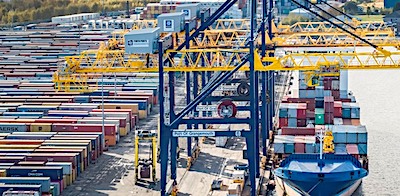Brexit has damaged the ability of UK companies to compete in the European Union, according to a survey from the British Chambers of Commerce (BCC).
The report found that 77% of firms said a deal struck two years ago to ease trade with the EU was not helping them increase sales or expand their businesses.
More than half (56%) of firms surveyed said they face difficulties adapting to the new rules for trading goods.
Almost half (45%) are facing difficulties adapting to the new rules for trading services, and a similar number (44%) reported difficulties obtaining visas for staff.
The BCC said it has sent the UK Government a report setting out solutions to many of the issues.
The survey of more than 1,168 businesses (92% SMEs) shows significant challenges for UK firms trying to use the Trade and Co-operation Agreement (TCA).
The TCA was agreed on Christmas Eve in 2020 to allow tariff-free trade with the EU once Brexit took effect.
But a high proportion of businesses said they are still having major problems trying to use the deal to trade with Europe.
The BCC has sent the Government a report setting out the main issues the TCA is causing with solutions to many ofthe problems.
The survey also found that alongside problems with the TCA, four in five (80%) firms had seen the cost of importing increase since January, more than half (53%) had seen their sales margins decrease and almost three quarters (70%) of manufacturers had experienced shortages of goods and services.
“Customs on both sides of the EU border seem to have a separate set of rules to be able to charge different amounts for the same thing,” said one retailer in Dundee. “We don’t know until it’s too late what these costs are.”
A retailer in Ayrshire said: “Leaving the EU made us uncompetitive with our EU customers.
“We would have lost all of our EU trade without a base in the EU. This has cost our business a huge amount of money which could have been invested in the UK had it not been for Brexit.”
A manufacturer in the East Midlands said: “Exporting goods into the EU since Brexit, continues to prove difficult. We have experienced a lot of our goods going missing when they reach customs control.
“Due to additional import costs, we have found that quite a few of our EU customers that we have dealt with for a long time, in regard to providing a qualifying service, now stay within the EU instead of the UK.”
A manufacturer in the East Midlands said: “Brexit has been the biggest ever imposition of bureaucracy on business.
“Simple importing of parts to fix broken machines or raw materials from the EU have become a major time-consuming nightmare for small businesses, and Brexit related logistics delays are a massive cost when machines are stood waiting for parts.
“We used to export lesser amounts to the EU, but the bureaucracy makes it no longer worthwhile.”
Shevaun Haviland, Director General of the British Chambers of Commerce, said: “Businesses want political leaders on both sides to move on from the debates of the past and find ways to trade more freely.
“This means an honest dialogue about how we can improve our trading relationship with the EU. With a recession looming we must remove the shackles holding back our exporters so they can play their part in the UK’s economic recovery.
“If we don’t do this now then the long-term competitiveness of the UK could be seriously damaged. It is nocoincidence that during the first 15 months of the TCA we stopped selling 42% of all the different products that we used to.
“Businesses feel they are banging their heads against a brick wall as nothing has been done to help them, almost two years after the TCA was first agreed. The longer the current problems go unchecked, the more EU traders go elsewhere, and the more damage is done.
“There are clearly some structural problems built into the TCA which cannot be addressed until it is reviewed in 2026.
“But as we set out in our report to Government there are some issues that do not need to wait on months of negotiations or major reviews to be fixed.”
